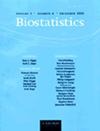贝叶斯药代动力学 I-II 期综合设计优化剂量安排方案
IF 2
3区 数学
Q3 MATHEMATICAL & COMPUTATIONAL BIOLOGY
引用次数: 0
摘要
给药计划通过改变药物的药代动力学(PK),对药物的毒性和疗效产生深远影响。PK 是剂量方案优化中不可或缺的重要组成部分。受此启发,我们提出了贝叶斯 PK 整合剂量表搜索(PKIDS)设计,通过整合 PK、毒性和疗效数据来确定最佳剂量表机制。根据剂量和时间表影响 PK,而 PK 又影响疗效和毒性的因果关系,我们首先为纵向剂量-浓度过程的边际分布指定了一个贝叶斯分层模型,从而对这三个终点进行联合建模。以血浆中的药物浓度为条件,我们将毒性和疗效联合建模为浓度的函数。我们根据中期数据不断更新对 PK、毒性和疗效的估计,利用效用对治疗方案的风险-收益进行量化,并通过自适应随机化做出自适应决策,将新患者分配到合适的剂量-疗程方案中。模拟研究表明,PKIDS 设计具有理想的运行特性。本文章由计算机程序翻译,如有差异,请以英文原文为准。
A Bayesian pharmacokinetics integrated phase I–II design to optimize dose-schedule regimes
The schedule of administering a drug has profound impact on the toxicity and efficacy profiles of the drug through changing its pharmacokinetics (PK). PK is an innate and indispensable component of the dose-schedule optimization. Motivated by this, we propose a Bayesian PK integrated dose-schedule finding (PKIDS) design to identify the optimal dose-schedule regime by integrating PK, toxicity, and efficacy data. Based on the causal pathway that dose and schedule affect PK, which in turn affects efficacy and toxicity, we jointly model the three endpoints by first specifying a Bayesian hierarchical model for the marginal distribution of the longitudinal dose-concentration process. Conditional on the drug concentration in plasma, we jointly model toxicity and efficacy as a function of the concentration. We quantify the risk-benefit of regimes using utility—continuously updating the estimates of PK, toxicity, and efficacy based on interim data—and make adaptive decisions to assign new patients to appropriate dose-schedule regimes via adaptive randomization. The simulation study shows that the PKIDS design has desirable operating characteristics.
求助全文
通过发布文献求助,成功后即可免费获取论文全文。
去求助
来源期刊

Biostatistics
生物-数学与计算生物学
CiteScore
5.10
自引率
4.80%
发文量
45
审稿时长
6-12 weeks
期刊介绍:
Among the important scientific developments of the 20th century is the explosive growth in statistical reasoning and methods for application to studies of human health. Examples include developments in likelihood methods for inference, epidemiologic statistics, clinical trials, survival analysis, and statistical genetics. Substantive problems in public health and biomedical research have fueled the development of statistical methods, which in turn have improved our ability to draw valid inferences from data. The objective of Biostatistics is to advance statistical science and its application to problems of human health and disease, with the ultimate goal of advancing the public''s health.
 求助内容:
求助内容: 应助结果提醒方式:
应助结果提醒方式:


